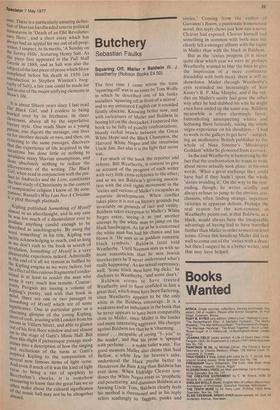Butchery
Sebastian Faulks
Squaring Off, Mailer v Baldwin W. J. Weatherby (Robson Books £4.50)
The first time I came across the term 'squaring off' was in an essay by Tom Wolfe in which he described one of his funky socialites 'squaring off in front of a mirror', and to my untutored English ear it sounded faintly obscene. Knowing better now, 'and
with caricatures of Mailer and Baldwin in boxing kit on the dustjacket, I expected this
book to be fully of punchy confrontations, bloody verbal brawls between the Great White Hope and the Black Champion, the Harvard White Negro and the streetwise Uncle Jim. But alas it is the fight that never was.
For much of the book the reporter and referee, Bill Weatherby, is content to give an account of the progress of each writer with very little cross-reference to the other; and so we see Baldwin's growing association with the civil rights movement in the 'sixties and various of Mailer's escapades as separate developments. When conflict takes place it is not on literary grounds but invariably on grounds of race and virility. Baldwin takes exception to Mailer's White Negro essay, seeing it as just another attempt by the white man to jump on the black bandwagon. As far as he is concerned the white man has had his chance and has blown it. 'He sees us as goddam romantic black symbols,' Baldwin later told Weatherby. 'Until Norman sees us with no more romanticism than he sees Jewish storekeepers he'll never understand what's really happening'. As for sexual supremacy, well, 'Some black men have big dicks,' he discloses to Weatherby, 'and some don't.' Baldwin seems to have trusted Weatherby and to have confided in him a great deal, which must have been flattering, since Weatherby appears to be the only white in the Baldwin entourage. It is a weakness and an imbalance in the book that he never appears to have been comparably close to Mailer, since Mailer is the louder and more interesting aggressor. His charges against Baldwin are that he is 'charming. . . minor . . incapable' of saying "f— you" to the reader', and that his prose is 'sprayed with perfume . . . a noble toilet water.' For good measure Mailer also claims that Saul Bellow, a white Jew for heaven's sake, understood the black psyche better in Henderson the Rain King than Baldwin has ever done. When Eldridge Cleaver condones the White Negro essay as 'prophetic and penetrating' and dismisses Baldwin as a fawning Uncle Tom, Baldwin clearly feels his method is threatened and in his 'reply refers scathingly to 'faggots, punks and sissies.' Coming from the author of Giovanni's Room, a passionate homosexual novel, this reply shows just how raw a nerve Cleaver had exposed. Cleaver himself had something in common with both men but clearly felt a stronger affinity with the rapist in Mailer than with the black in Baldwin.
But as the 'sixties progress (it is never quite clear which year we were in: perhaps Weatherby wanted to blur the lines to give the impression of a more continuous friendship with both men), there is still no showdown. Mailer through Weatherby's eyes reminded me increasingly of Ken Kesey's R. P. Mac Murphy, and if the verdict on Mailer's sanity had gone the other way after he had stabbed his wife he might even have ended up the same way. Baldwin meanwhile is often alarmingly fierce, buttonholing unsuspecting whites and lecturing them furiously, taking the whole negro experience on his shoulders — 'I had to work in the galleys to get here' — subjecting an inoffensive British publisher to the whole of Nina Simone's 'Mississippi Goddam' whilst he glowered from a corner.
In the end Weatherby is hamstrung by the fact that the confrontation he wants to write about never actually took place: in his own words, 'What a great exchange they could have had if they hadn't spent the whole 'sixties avoiding it.' On the way to the nonending, though, he writes acuttly and always refuses to jump to the obvious conclusions, often' finding strange, important victories in apparent defeats. Perhaps the real reason for the non-contest, as Weatherby points out, is that Baldwin, as a black, would always have the insuperable advantage of having had to have travelled further than Mailer in order to meet on level terms. Given this handicap Mailer did very well to come out of the 'sixties with a draw; but then I suspect he is.a better writer, and that may have helped.






































 Previous page
Previous page